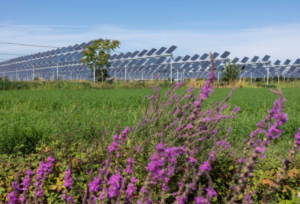Written by Aggeliki Marinou, environmental engineer at Wattcrop.
 As the world grapples with the twin challenges of climate change and food security, the integration of renewable energy and sustainable agriculture offers a promising solution. Renewable energy technologies, such as solar, wind, and biomass, have gained traction in recent years as alternatives to fossil fuels. Similarly, sustainable agriculture practices aim to minimize environmental impact while ensuring food production. By combining these two spheres, we can unlock numerous opportunities for synergy that will pave the way for a greener and more food-secure future.
As the world grapples with the twin challenges of climate change and food security, the integration of renewable energy and sustainable agriculture offers a promising solution. Renewable energy technologies, such as solar, wind, and biomass, have gained traction in recent years as alternatives to fossil fuels. Similarly, sustainable agriculture practices aim to minimize environmental impact while ensuring food production. By combining these two spheres, we can unlock numerous opportunities for synergy that will pave the way for a greener and more food-secure future.
1. Powering Agriculture with Renewable Energy:
Renewable energy sources have the potential to revolutionize the way agriculture is powered. Solar energy, for instance, can be harnessed through photovoltaic systems to generate electricity for agricultural operations. Solar-powered irrigation systems offer a reliable and sustainable solution for watering crops, reducing reliance on fossil fuel-driven pumps. Additionally, wind energy can be utilized to power farms through wind turbines, providing a clean and abundant source of electricity.
2. Bioenergy and Agriculture:
Bioenergy, derived from organic materials such as crop residues, agricultural waste, and dedicated energy crops, holds immense promise for sustainable agriculture. Through anaerobic digestion, organic waste can be transformed into biogas, a renewable energy source that can be used for cooking, heating, or electricity generation. The residual digestate can also be used as a nutrient-rich fertilizer, promoting soil health and fertility. Furthermore, biofuels derived from dedicated energy crops can power agricultural machinery, reducing carbon emissions and promoting energy independence for farmers.
3. Energy Efficiency and Conservation:
Renewable energy and sustainable agriculture go hand in hand with energy efficiency and conservation. Implementing energy-saving practices such as precision agriculture, which optimizes resource use through technologies like sensors and data analysis, reduces energy consumption while maximizing crop yields. Energy-efficient infrastructure, such as insulated greenhouses or energy-efficient irrigation systems, minimizes energy waste. These strategies not only lower operating costs for farmers but also contribute to a greener agricultural sector.
4. Synergistic Benefits for Ecosystems and Biodiversity:
The integration of renewable energy and sustainable agriculture can have positive ecological impacts. By adopting renewable energy sources, farmers can reduce their carbon footprint, mitigating climate change and its adverse effects on agriculture. Furthermore, sustainable agriculture practices, such as agroforestry or organic farming, contribute to biodiversity conservation and ecosystem restoration. Renewable energy installations, when designed and managed properly, can coexist with agricultural landscapes, providing habitats for wildlife and supporting pollinators.
5. Rural Electrification and Income Generation:
Renewable energy initiatives in rural agricultural areas have the potential to enhance the quality of life for farming communities. Access to electricity can power rural industries, processing facilities, and cold storage, enabling value addition to agricultural products. This, in turn, can lead to increased income generation and improved livelihoods for farmers. Additionally, the excess energy generated from renewable sources can be sold back to the grid, providing an additional revenue stream for farmers.
The integration of renewable energy and sustainable agriculture presents a unique opportunity to address the interconnected challenges of climate change, food security, and rural development. By embracing renewable energy technologies and sustainable farming practices, we can create a synergistic relationship that benefits both agriculture and the environment. Governments, agricultural organizations, and energy stakeholders must collaborate to provide policy support, financial incentives, and technical assistance to promote the adoption of renewable energy in agriculture. Together, we can harness the power of renewables and sustainable agriculture to build a more resilient, productive, and sustainable future for our planet.
Find more interesting articles on our news page!

